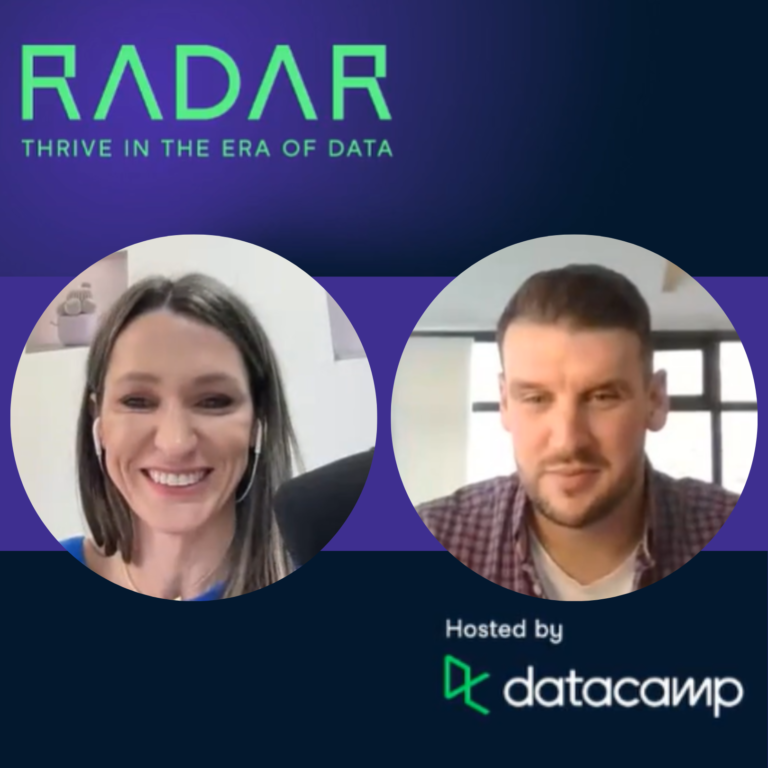
How is Data & Analytics Talent Evolving in 2023?
Last month, our CEO and Founder, Kyle Winterbottom was excited to join an expert speaker lineup at RADAR, DataCamp’s virtual event curated to equip businesses and individuals with the insights to thrive with data. Throughout Orbition Group’s session, Kyle and host Alina Georgescu covered how data leaders should approach data & analytics talent in 2023, the nuances between hiring for leadership and technical roles, how to attract and retain top talent, and how to build an employer branding that is visible. They also discussed, for those in the market for new opportunities, best practices to stand out in a competitive market, and the importance of soft skills and value creation in building a successful data career. You can watch the full session, here.
However, 45 minutes just wasn’t enough to cover this important topic. Kyle received a huge number of quality questions from the audience, and below he replies to some we didn’t get a chance to answer during the live session.
How does one stay ahead of the curve in the data job market? Are there any specific skills that you foresee becoming more rewarding?
Traditionally there have been two routes. The first is, to follow a technical discipline and become a really good Analyst, Scientist, Architect, Engineer, etc. The second is to become more business-facing. The latter usually has more emphasis on “soft skills” like communication, translation, storytelling, influencing, relationship building, commercial awareness, etc. Whereas the former promotes a greater emphasis on specific technical skills and capabilities such as building infrastructure, platforms, models and dashboards, etc.
I think it’s solely down to preference on which route someone should choose to go, and equally, just because someone chooses a technical route doesn’t mean they won’t benefit greatly by improving and focusing on the “soft skills” but making a decision based on what you would prefer to do day to day (as in build technical solutions or be out speaking with stakeholders in the business).
All of that said, I think the D&A industry has proven many times over that it’s the soft skills that make all of the difference, and of the countless teams that I’ve built for organizations over the years, it’s often been the least technically gifted, but the ones who are able to communicate with business users and stakeholders to understand what they truly want and need and deliver that, that often climb up the career ladder quicker.
What data skills do you see growing fastest (in regard to demand) in the next 2 years?
At the end of 2021, I put my neck on the line and suggested that ‘Data Product’ or ‘Data as a Product’ will be the next big thing in the Data & Analytics industry over the next few years, and we’re starting to see that take shape. There are many people much smarter than me that are also banging the product drum and suggest that building data products is what helps us to connect technical solutions to business outcomes (ROI).
The skills to be a Data Product Owner or Manager really encompass enough technical knowledge of how to build a solution, but with the business acumen and stakeholder skills to work within certain business domains to drive adoption and usage of said data products.
In addition, ESG data is going to become a huge thing for the D&A industry and as such, anyone with ESG experience right now will be in high demand but in short supply. A great situation to be in on an individual basis.
Analytics Engineering is also another interesting role that’s coming to the fore which will be very popular and the MLOps landscape is also growing in popularity. Both will see significant investment over the next few years.
Are there sectors of the business world that you would suggest are lagging and more in need, and what are the skills needed for the maturity progression of a data analytics practice in an organization?
Sectors that have relied on data for years are typically further along the maturity curve. For example; organizations in heavily regulated environments such as Financial Services or Pharmaceuticals that have needed to do a lot of regulatory data work tend to be further ahead and obviously are now doing more “offensive” work and not tied just to the regulatory aspects of the role.
Then you have sectors that operate heavily in the B2C space such as Retail and eCommerce, where they’ve been using Data & Analytics for a long time to win and retain customers, etc.
There are obviously certain sectors that are more traditional that aren’t as far along the maturity curve but are making strides to catch up – the legal sector being a prime example.
But simply, the more familiar an organization is working with data and using it to make decisions is likely to have a culture where that’s considered normal or best practice. Organizations that haven’t been in that situation often don’t have that culture. There is usually a link between data culture and data maturity, although they don’t always correlate.
What do companies look for in a resume outside of a list of technical skills?
Ironically, and unfortunately not a lot. This is one of the biggest challenges that we face in the D&A industry is that many organizations, struggle to decouple Data and IT and as such, have an almost exclusive focus on hiring for technical skills.
That said, what they should also be hiring for are great “soft skills” (in quotation marks because they’re the hardest to master) – things such as communication, storytelling, translation, influencing, business/commercial acumen and relationship building, etc.
And for leadership roles, the ability to convert Data & Analytics into a commercially beneficial function of the business.
Do LinkedIn recommendations help indicate soft skills?
Linkedin recommendations are a great tool to help you land a job and show what you can do. As with anything that is written, it can often be hard to interpret exactly what someone is trying to say unless what is being stated is explicitly obvious. If you want to demonstrate your soft skills, then I’d suggest asking the person who is recommending you to focus on that part of your skill-set, or at least touch upon it and be explicit with that message.

Kyle Winterbottom
Kyle is hugely passionate about enabling organizations to drive decisions and obtain value from the use of Data, Analytics & AI.
The two biggest assets a business has are People & Data!
Kyle speaks to hundreds of Data & Analytics leaders every year and says every single one is facing similar challenges to you, in some way, shape, or form. That is what led him to create Orbition Group. Read more.


